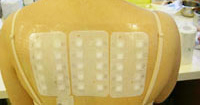

In order to effectively treat allergic diseases, an accurate diagnosis is essential. A careful history and physical examination, supplemented by diagnostic testing, will allow the physician to understand what is triggering your allergic symptoms. This will allow us to give you advice and treatment specific to your situation.
At the Centre for Allergy and Asthma Care, we have a fully equipped laboratory that can provide the following services:

Skin prick tests involve the introduction of a tiny amount of each allergen into the skin by lightly pricking through the surface layer of the skin. A small swelling surrounded by redness will appear after 15 minutes if the reaction is positive. The allergist will decide which allergens need to be tested based on the patient’s clinical history. Skin prick tests are quick, safe and accurate. A large variety of allergenic extracts are commercially available for testing.
Skin tests should be done under the supervision of an allergist to minimize the risk of rare side effects.
(Educational Video)| Animal dander | House Dust mites | Molds |
| Pollens | Venoms from stinging insects | Foods |
| Latex | Drugs such as penicillin | Local anesthetics |
Skin testing by intradermal injections is occasionally required to enhance the sensitivity of the tests under specific circumstances.

This test involves sending blood to a laboratory to test for the presence of IgE antibodies that bind to specific allergens. In general, skin prick tests are more sensitive and specific than IgE blood tests, since skin tests directly demonstrate the body’s response to an allergen, whereas blood tests merely demonstrate IgE antibody binding in the test tube. Antibody binding alone is not sufficient to produce an immune response, and does not necessarily lead to clinical reaction. Blood testing should be used if the patient has skin conditions that preclude accurate skin testing, such as severe eczema, active urticaria (hives), or if the patient has taken drugs that will suppress skin test reactions. Positive blood test results often require verification with challenge testing.
Challenge testing involves the introduction of an allergen by ingestion, injection or inhalation to determine the patient’s clinical response. It is the gold standard for diagnosing food allergy, drug allergy and asthma. It is very important that challenge tests be conducted by an allergist experienced in its use.

The latest generation of multiplex assay employs nanotechnology. The size of these nanobeads is 1000-fold smaller than the chip microarray, allowing 172 allergens…(More)